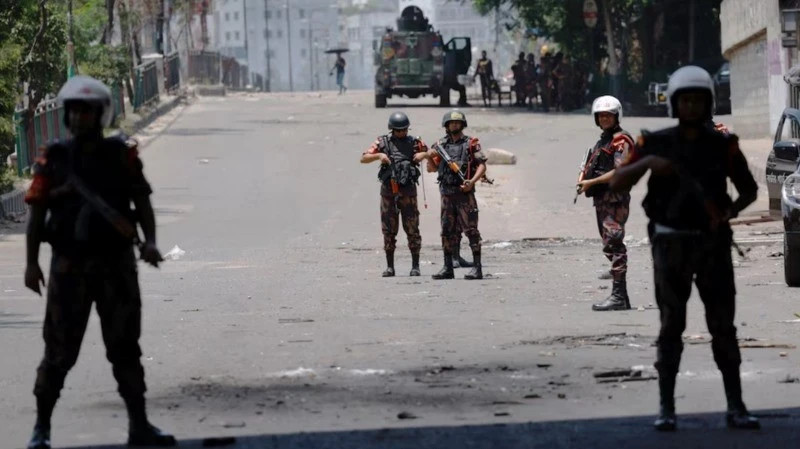Bangladesh has been in turmoil since protests led by students against civil service job quotas erupted in July. The protests escalated into a movement against the government, demanding Prime Minister Sheikh Hasina's resignation after 15 years in power, and turned into riots resulting in more than 400 deaths.
Series of difficult issues
The crisis in Bangladesh stems from socio-economic problems, with stagnation in private sector job growth. Bangladesh's economy was severely hit by the COVID-19 pandemic. The textile industry, a key driver of the economy which accounts for more than 80% of the country's 55 billion USD annual export value, was heavily damaged. Garment factories closed, causing at least a quarter of the workforce to lose their jobs.
During the post-pandemic period, this backbone industry has been unable to recover amid economic recession and global inflation, leading to a more than 30% decrease in Bangladesh's textile orders. Global geopolitical situations have affected the global supply chain, and rising fuel prices have severely impacted Bangladesh's economy.
More than 65% of the garment exports of the world's second-largest textile exporter (after China), valued at billions of dollars, are supplied to Europe and the US via the Red Sea-Suez maritime trade route, which is facing serious security threats and frequent disruptions from attacks. Additionally, the Bangladesh government still relies on high cost imported fuel to operate the power grid for production and daily activities.
In her early tenure, Hasina contributed to revitalising the country's economy, transforming Bangladesh from a poor nation to one of the fastest-growing economies in the world. Since 2008, Bangladesh has achieved an average growth rate of over 6% per year. The living standards of the people have been significantly improved. The poverty rate has been greatly reduced, and more than 95% of the 170 million population has access to electricity.
Life expectancy in Bangladesh has increased by more than 50%. Infant mortality rates have decreased by nearly 90%. According to the World Bank (WB), Bangladesh's per capita income in 2021 surpassed that of India, reaching 2,457.92 USD. The International Monetary Fund (IMF) predicts that Bangladesh's GDP will soon surpass that of Denmark or Singapore.
However, difficulties arising from the onset of the COVID-19 pandemic have severely impacted the "health" of the Bangladeshi economy. The economy, primarily reliant on exports and dependent on fuel prices, has faced compounding challenges amid global market fluctuations. Recently, Bangladesh has been grappling with nearly double-digit inflation, an unstable exchange rate, and depleting foreign currency reserves.
Since early 2022, the value of the country's currency, the taka, has declined by more than 40% against the USD. Foreign currency reserves have more than halved. Rising fuel prices have driven up the costs of food and other necessities. In 2023, Hasina's government had to resort to a 4.7 billion USD loan from the IMF to alleviate difficulties.
Soaring inflation has placed the people in precarious positions, pushing many into poverty and leading to continuous protests. Economic hardships, numerous business bankruptcies, and factory closures have also increased the unemployment rate. It is estimated that nearly 32 million young Bangladeshis are either unemployed or not receiving education.
Despite Hasina's efforts after being re-elected for a fourth term in the January 2024 election, the situation has not seen much improvement. After Hasina's resignation, the military took power and established an interim government. However, experts believe that the persistence of issues of poverty, unemployment, and inequality have created a void of instability in Bangladesh.
Hidden Risks
After Prime Minister Hasina resigned and left Bangladesh, her residence in the capital city of Dhaka was looted by rioters. Incidents of arson and looting have occurred across the country. Bangladesh Army Chief Waker-uz-Zaman called on the people to abide by law and order and announced the formation of an interim government.
The Bangladesh Army's public relations office also announced a major overhaul within the force. President Mohammed Shahabuddin, along with the heads of three agencies and coordinating members of the Anti-Discrimination Student Movement, swiftly completed the framework of the interim government. They agreed to nominate Muhammad Yunus, the 2006 Nobel Peace Prize laureate, to become the head of the interim government in Bangladesh.
President Shahabuddin urged all parties to work together to resolve the crisis. The United Nations, the European Union (EU), the US, and Bangladesh's neighbouring countries have expressed concern about the risk of escalating violence and called on all parties in Bangladesh to remain calm and restrained. They emphasised the importance of a peaceful, orderly, and democratic transition process.
EU Ambassador to Bangladesh Charles Whiteley highlighted that EU delegation leaders are deeply concerned by the numerous attacks on places of worship and members of religious and ethnic minorities in the South Asian country. The EU called on all parties to exercise restraint, oppose violence against communities, and protect the human rights of all Bangladeshi citizens. The Chinese Ministry of Foreign Affairs stated that Beijing is closely monitoring the situation and hopes Bangladesh will soon restore social stability.
The US Department of State also announced that Washington has ordered the evacuation of non-emergency government employees and their families from Bangladesh. The IMF reaffirmed its commitment to Bangladesh, continuing to support efforts to ensure economic stability and promote growth for the South Asian nation.
However, amid the current chaotic and turbulent situation, restoring order, political stability, and economic recovery is extremely challenging task for Bangladesh. According to experts, the only way to pull the country out of the current crisis is to ensure public participation in the decision-making process and to swiftly transition to a democratically elected, transparent, and accountable government.
















